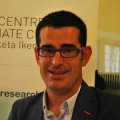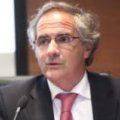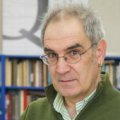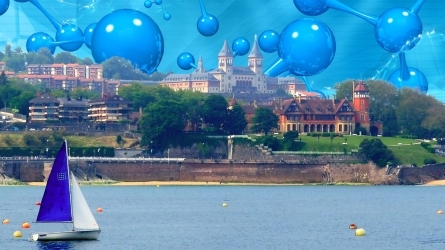Climate Change: Challenges after the Paris Agreement
Descripción
Objetivos
The objective of the summer school is to offer an updated and recent view of the ongoing trends in Climate Change research in an annual basis.
This seventh edition of the Summer School will continue with the multidisciplinary approach and will focus on the Climate Summit results in Paris. The structure of the school will follow the IPCC (International Panel for Climate Change) general meetings, with two sessions devoted to the subjects of the three IPCC Working Groups: climate science, adaptation and impact and mitigations of climate change. The third day will be focussed on understanding the political process that lead us to the COP 21 in Paris (2015) and the resulting agreement. The so-called Paris Agreement signed on December 12th can be seen as the culmination of more than two decades of international attempts under the United Nations to forge collective action on climate change. There is widespread consensus that the Agreement has been a diplomatic success. The Paris Agreement provides a solid foundation for substantial progress on climate change. Even if the limits that current Intended Nationally Determined Contributions (INDCs) place on future greenhouse gas emissions are too weak to ensure that the agreed 2ºC limit on warming will not be breached, these national pledges may form the basis of a virtuous circle of ambition. Different speakers will try to cover all the current key issues in climate change such as: artic sea ice, ocean circulation, see level rise, impacts on water, food and health, mitigation options, climate policy and economic instruments.
The school is open to PhD Students, postdoctoral fellows and other researchers as well as policy makers interested in acquiring a deep understanding of climate change and the policies designed to fight it.
Website of the congress: http://www.bc3research.org/summerschool2016
For further information, please contact: summerschool@bc3research.org
Colaboradores
- This school is jointly organized with Departamento de Fundamentos de Análisis Económico I (Marta Escapa)
Programa
11-07-2016
“Welcome and opening of 2016 School“
- Ibon Galarraga Gallastegui BC3, Basque Centre for Climate Change - Co-director of the School
- María José Sanz Sánchez BC3, Basque Centre for Climate Change
“Current challenges in the impacts and adaptation to climate change“
- Anil Markandya BC3, Basque Centre for Climate Change
“REDD and climate change“
- María José Sanz Sánchez BC3, Basque Centre for Climate Change
Break
“Adapting to Sea Level Rise“
- Iñigo Losada IH Cantabria and IPCC
“Synthesis Session“
- Marta Olazabal BC3, Basque Centre for Climate Change
12-07-2016
“Opening Session“
“International climate policy: The Aftermath of Paris“
- Alina Averchenkova Grantham Research Institute on CC, LSE
“Carbon policy and the structure of global trade“
- Christoph Böhringer University of Oldenburg
Break
“The Paris meeting outcome: the vision of an international power utility “
- Gonzalo Saenz de Miera Asociación Española de Economía Energética
“Poster Presenting Session“
“Synthesis session“
- Ibon Galarraga Gallastegui BC3, Basque Centre for Climate Change - Co-director of the School
Break
Donostia United Nations Summit/ Adaptation Theory Game. Moderator: Marta Escapa (UPV/EHU) and Josu Lucas (BC3) Participants: all the students
Cycling tour and "pintxos" night
13-07-2016
“Opening Session“
“Current Challenges in climate science“
- Sergio Henrique Faria , Basque Centre for Climate Change
“Marine ecosystems in a warming ocean“
- Guillem Chust Peters AZTI-Tecnalia
Break
“The Anthropocene is functionally and stratigraphically distinct from the Holocene“
- Alejandro Cearreta UPV-EHU
“Conclusions and future developments“
- Elisa Sainz de Murieta Zugadi , Basque Centre for Climate Change
- Marta Escapa Garcia UPV/EHU
Directoras/es

Ibon Galarraga Gallastegui
BC3, Basque Centre for Climate Change, Senior Researcher
BC3 Basque Centre for Climate Change Ph.D. in Economics (Environmental Economics) from the University of Bath (UK), M.A. Economics at the University of Essex (UK) and B.A. Economics (speciality of International Economics and Development) at the University of Basque Country. He has worked as an environmental consultant for many years for both public and private clients such as the World Bank, the Department for International Development of the British Government or the Basque Government. He was co-founder of a consultancy company. Ibon taught microeconomics and macroeconomics at the University of Bath and Economic Policy at the University of Deusto.
Ponentes
Dr. Alina Averchenkova is a Distinguished Policy Fellow at the Grantham Research Institute at the London School of Economics. She leads Governance and Legislation research theme at the institute. Alina’s most recent work focuses on the implementation of the Paris agreement, in particular the analysis of experiences with climate change governance and legislation around the world and capacity building and advisory to governments and parliaments on the design and implementation of climate and energy laws. Alina has over nineteen years of experience in climate policy and international development. Prior to joining the LSE in 2013, Alina worked for KPMG as Global Director for Climate Change and Carbon; the UN Framework Convention on Climate Change supporting international negotiations on climate change; for a carbon-asset manager First Climate in Zurich and for the Environmental Defence Fund in Washington, DC; Metroeconomica Ltd and for the Russia’s Bureau of Economic Analysis.
Since May 1st, 2012, Prof. Dr. Christoph Böhringer has been a member of the Commission of Experts for Research and Innovation that was established by the German government. Christoph Böhringer is professor for economic policy at the Carl von Ossietzky University in Oldenburg. After his graduation as industrial engineer from the Technical University of Karlsruhe, he received a doctorate in economics at the University of Stuttgart in 1995, where he became head of the section „Energy Economics“ at the Institute for Energy Economics and the Rational Use of Energy (IER). From 1999 to 2006, he led the department „Environmental and Resource Economics, Environmental Management” at the Centre for European Economic Research (ZEW) in Mannheim. In 2002, he habilitated in economics at the University of Regensburg and in 2004 he became professor of economics at the University of Heidelberg.
Alejandro Cearreta graduated in Geology (University of the Basque Country UPV/EHU) and holds a PhD in Geology (University of Exeter, UK). Alejandro Cearreta is responsible for the Master degree, the PhD Programme and the UFI (Formation and Research Unit) in Quaternary: Environmental Changes and Human Fingerprint. Alejandro is leader of the Harea-Coastal Geology research group (IT976-16) at the UPV/EHU. He is responsible of the Joaquín Gómez de Llarena Laboratory (Geo-Q Research Centre, Sociedad de Ciencias Aranzadi) and Editor of the CKQ (Estudios de Cuaternario/ Kuaternario Ikasketak/ Quaternary Studies) Journal, ISSN 2174-3703, published by the Sociedad de Ciencias Aranzadi.

Guillem Chust Peters
Guillem Chust se licenció en biología en la Universidad de Barcelona y se doctoró en la Universidad Paul Sabatier de Toulouse en 2002. Posterior a una estancia postdoc en el CNRS francés, se incorporó en la Unidad de Investigación Marina de AZTI en 2005, donde ha llevado a cabo estudios de macroecología marina e impactos del cambio climático en el medio marino costero, la pesca y la biodiversidad marina. Es autor de más de 80 publicaciones en revistas internacionales con factor de impacto, como por ejemplo Nature Communications. En AZTI, es responsable de Cambio Climático en Océanos y Costas.

Marta Escapa Garcia
Associate Professor of Economics, UPV/EHU
Marta Escapa (Ph.D. in Economics, 1996, UPV/EHU) is Associate Professor at the University of the Basque Country (UPV/EHU). Her research and teaching activity has developed in the area of Economic Analysis and, specifically, in Environmental and Resource Economics. She has over 20 years of research and teaching experience that covers both undergraduate and graduate courses on Natural Resource Economics and Environmental Economics and her research has focused on issues like: International Environmental Agreements on Climate Change; Intergenerational Dimension of Climate Change, Economic Analysis of Fisheries Management; Environmental Fiscal Reform and Unemployment; Solid Waste Management using System Dynamics. The main results from this research have been published in peer review journals with impact factor (JCR) like: Journal of Environmental Economics and Management, Environmental and Resource Economics, Energy Economics or Ecological Economics.
S.H. Faria (Dr.rer.nat. Darmstadt University of Technology, Germany, 2003) is Ikerbasque Research Professor at BC3 and Adjoint Presidential Professor at the Nagaoka University of Technology (NUT), Japan. He is Head of the BC3 Research Line “Climate Basis”, Director of the “IzotzaLab” (BC3’s low-temperature research facility), and leader of the Team “Climate Change, Environment and Human Well-Being” within the UPV/EHU Doctorate Programme “Quaternary: Environmental Change and Human Ecological Footprint”. He is also European Coordinator of the “GIGAKU Education Programme for Innovative Global Engineers”, which is part of the “Top Global University Project” of the Japanese Government. He is Associate Editor-in-Chief of Journal of Glaciology and Editorial Board Member of Scientific Reports. He is also Lead Author of “Chapter 1: Framing, Context, Methods” of the 6th Assessment Report, Working Group 1 (AR6-WG1) of the Intergovernmental Panel on Climate Change (IPCC).

Iñigo Losada
IH Cantabria and IPCC, Director
Iñigo Losada is the Research Director at IH Cantabria. He has also been Director of the Department of Water and Environmental Sciences and Techniques (2000-2003) and is Professor of Hydraulic Engineering at the Faculty of Civil Engineering of the University of Cantabria. He holds a Doctorate in Civil Engineering from the University of Cantabria and a PhD in Civil Engineering from the University of Delaware (USA) where he worked as a researcher at the Center for Applied Coastal Research from 1989 to 1992. Iñigo has been lead researcher in projects within the Spanish National Plan, the European Union and other international research agencies. He has also led over 50 transfer projects for the United Nations, the Inter-American Development Bank, the Council of Europe and several national and international companies and public administrations. He is lead researcher of the Unique Scientific and Technological Infrastructure “Cantabria Coastal and Ocean Basin”.

Anil Markandya
BC3, Basque Centre for Climate Change and IPCC, Senior Researcher
Professor Markandya is a resource economist who has worked in this field for over thirty years and is acknowledged as one of the leading authorities. He is the former Scientific Director of BC3, Basque Centre for Climate Change. He graduated from the London School of Economics with a Master of Science in Econometrics in 1968 and was awarded his Ph.D. on the Economics of the Environment in 1975.Since then he has divided his time between academic and advisory work. On the academic side he has published widely in the areas of climate change, environmental valuation, environmental policy, energy and environment, green accounting, macroeconomics and trade. Some of his best-known works include, ´Blueprint for a Green Economy’, ´Green Accounting in Europe’, ´Reconciling Trade and Development’ and ´Cleaning the Ganges’.

Marta Olazabal
BC3
Marta Olazabal is post-doctoral researcher at the Basque Centre for Climate Change (BC3). She is Chemical Engineer by training specialized in Environment (School of Engineering of Bilbao, 2004). Combining work and studies, Marta gained an MSc on Environmental Engineering in 2009 and a PhD in the Department of Land Economy of the University of Cambridge in 2014. Marta has undertaken scientific stays in research institutes of Germany (IÖR, Dresden), The Netherlands (IVAM, Amsterdam) and United Kingdom (University of Newcastle, School of Civil Engineering & Geosciences, Newcastle upon Tyne). In 2011, she co-funded the Urban Resilience Young Researchers Network (URBNet) and she is also member of other international networks related to cities and resilience. Working mainly within the local scale, Marta collaborates in different national and international projects.

Gonzalo Saenz de Miera
Iberdrola, Director de Cambio Climático
Gonzalo Sáenz de Miera es Doctor en Economía Aplicada por la UAM - Es Director de Cambio Climático y Alianzas de Iberdrola, - Vicepresidente de la Asociación Española de Economía de la Energía - Vicepresidente del Grupo Español de Crecimiento Verde - Director del MBA en Energy Business en Enerclub - Es un experto en los campos de la energía, la economía y el cambio climático y el medio ambiente.

Elisa Sainz de Murieta Zugadi
UPV/EHUko irakaslea eta BC3 Basque Centre for Climate Change erakundeko ikertzaile elkartua
Soy investigadora y profesora en el departamento de Economía Aplicada de la UPV/EHU, así como investigadora asociada del BC3. Soy doctora en ciencias geológicas (UPV/EHU) y mi investigación se centra en estudiar los impactos del cambio climático, así como las políticas y medidas de adaptación, desde una perspectiva socioeconómica. Empecé mi carrera profesional en una cooperativa del Grupo Mondragón y después tuve la oportunidad de trabajar en la administración pública como Directora de Biodiversidad (Gobierno Vasco). Durante esta etapa fui consciente de la importancia de la ciencia para apoyar la toma de decisiones, por lo que al finalizar este periodo decidí iniciar mi camino en la academia. En 2010 tuve me uní a BC3 para desarrollar mi tesis doctoral sobre los impactos asociados a los cambios del nivel del mar en la costa vasca. He sido investigadora visitante en la London School of Economics y he trabajado en diversos proyectos de investigación internacionales, estatales y locales.
Directora Científica de BC3, Basque Center for Climate Change desde enero de 2016. Doctorado en Ciencias Biológicas por la Universidad de Valencia (1991) y con experiencia en varias áreas científicas como Ecofisiología, Efectos de la contaminación del aire, Plantas inferiores y superiores, Dinámica y química atmosférica, Ciclos del nitrógeno y del carbono, Gases de efecto invernadero y otros gases relacionados, Gas de efecto invernadero inventarios, UTCUTS y REDD +. Ha estado fuertemente involucrada en la dimensión política del Cambio Climático, guiando decisiones políticas llevadas a cabo en centros como la FAO (Organización de las Naciones Unidas para la Alimentación y la Agricultura) o la CMNUCC (Convención Marco de las Naciones Unidas sobre el Cambio Climático). Tiene experiencia en procesos multilaterales, marcos regulatorios, medidas de políticas e instrumentos de Política de Cambio Climático, y lideró la implementación de diferentes programas con un enfoque multidisciplinar.
Precios matrícula
| REGISTRATION | Hasta 30-04-2016 | Hasta 31-05-2016 | Hasta 08-07-2016 |
|---|---|---|---|
| 90,00 EUR | 105,00 EUR | 125,00 EUR | |
| 0 EUR | 0 EUR | 0 EUR |
Lugar
Palacio Miramar
Pº de Miraconcha nº 48. Donostia / San Sebastián
Gipuzkoa
Palacio Miramar
Pº de Miraconcha nº 48. Donostia / San Sebastián
Gipuzkoa









